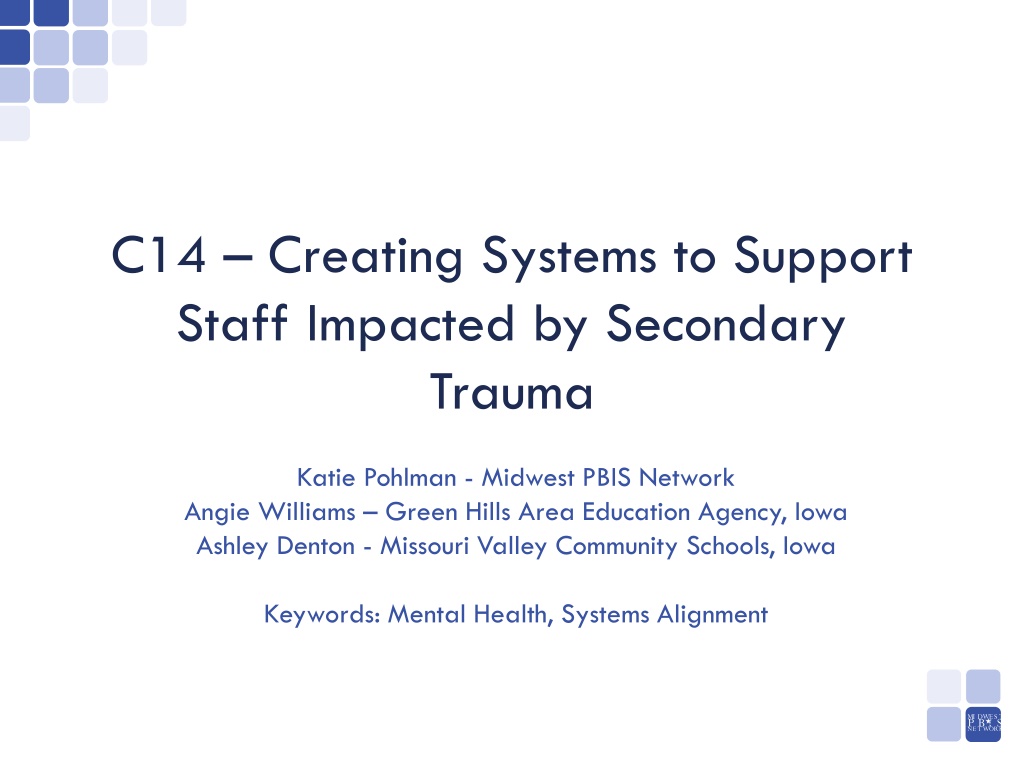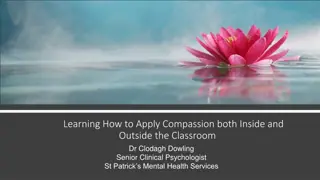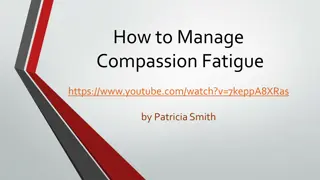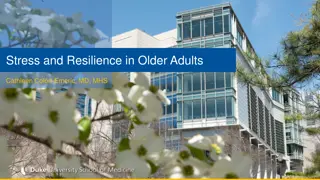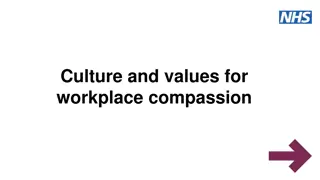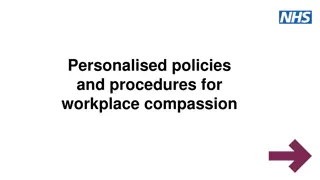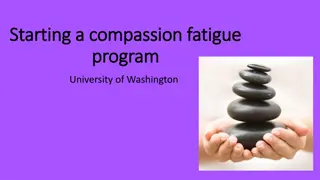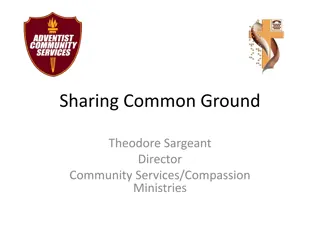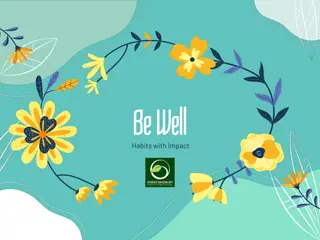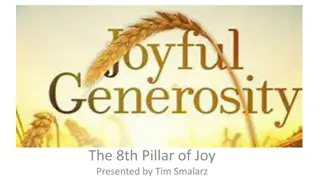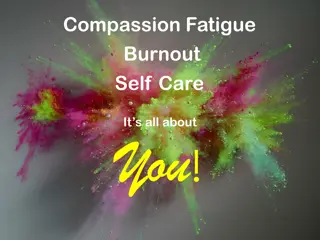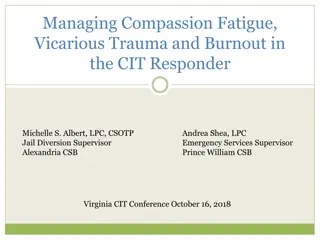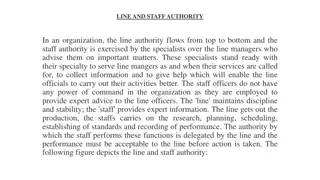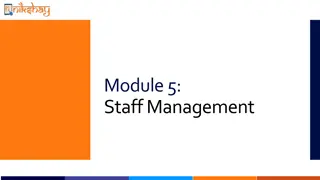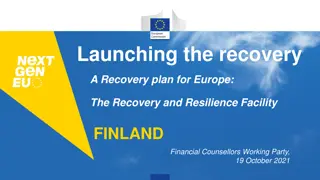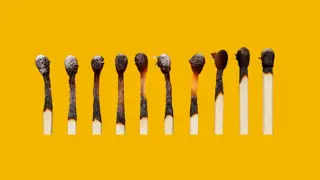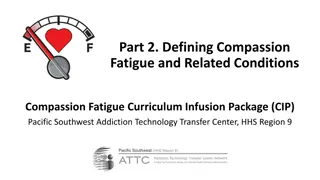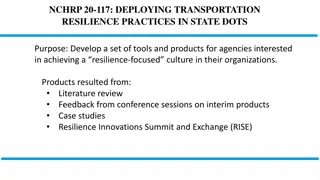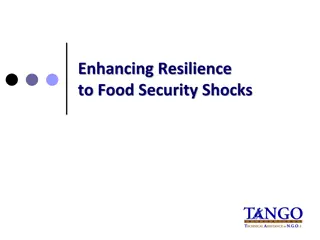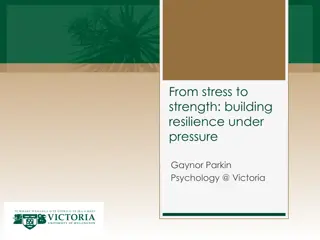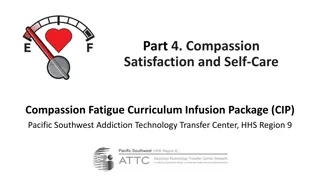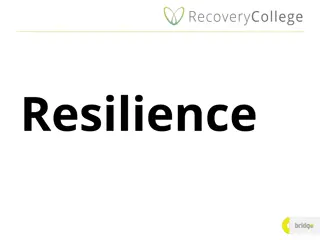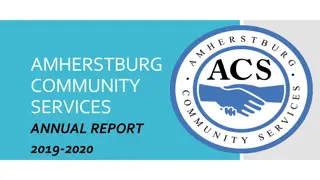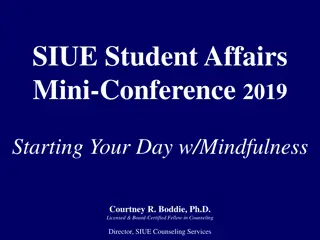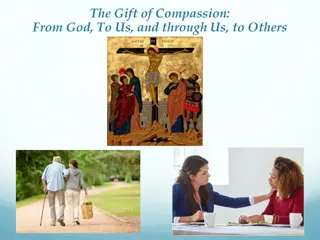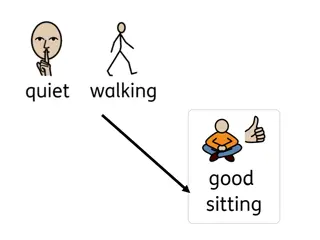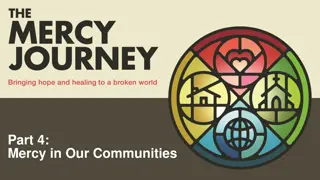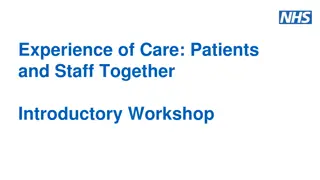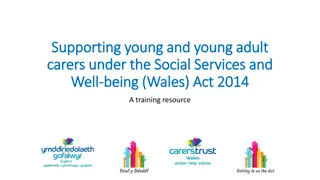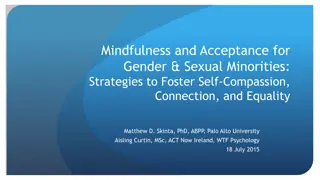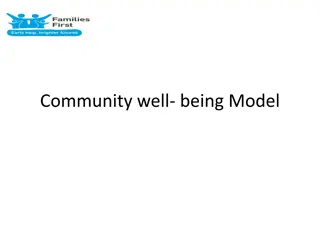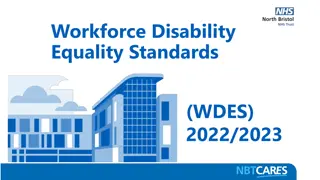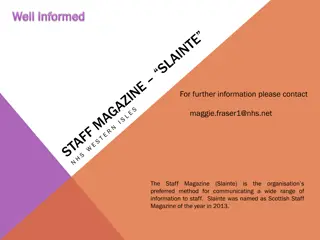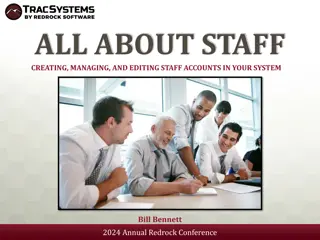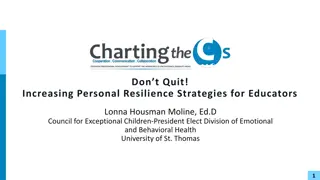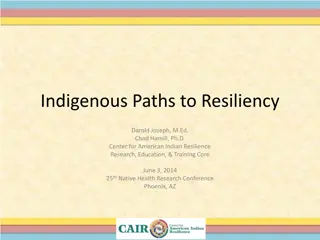Supporting Staff Well-Being: Strategies for Compassion Resilience
Education professionals often face challenges like compassion fatigue and burnout. This session focuses on implementing self-care practices in schools to foster a culture of compassion resilience. Learn to recognize and address staff stress, apply terms like compassion satisfaction and resilience, and create action plans for supporting well-being.
Uploaded on Sep 22, 2024 | 0 Views
Download Presentation

Please find below an Image/Link to download the presentation.
The content on the website is provided AS IS for your information and personal use only. It may not be sold, licensed, or shared on other websites without obtaining consent from the author. Download presentation by click this link. If you encounter any issues during the download, it is possible that the publisher has removed the file from their server.
E N D
Presentation Transcript
C14 Creating Systems to Support Staff Impacted by Secondary Trauma Katie Pohlman - Midwest PBIS Network Angie Williams Green Hills Area Education Agency, Iowa Ashley Denton - Missouri Valley Community Schools, Iowa Keywords: Mental Health, Systems Alignment MI DWES T NE TWORK P B I S
Description Education is a helping profession, and many of us have heard the terms compassion fatigue, secondary trauma, and burnout often associated with helping professions. Coaches and leaders will leave this session able to apply data, systems, and practices of self-care within their schools to promote a culture of compassion resilience. MI DWES T NE TWORK P B I S
Outcomes Apply the terms compassion fatigue, compassion satisfaction, and compassion resilience to your school staff Formulate an action plan to install systems and practices to support staff self-care and compassion resilience Identify data to monitor fidelity and outcomes of creating culture of compassion resilience MI DWES T NE TWORK P B I S
March 11-14, 2020 MI DWES T NE TWORK P B I S
MI DWES T NE TWORK P B I S
The Missing Piece SELF- CARE Curriculum Based Measurement PBIS Formative Assessment Restorative Practices Classroom Management Trauma Informed MI DWES T NE TWORK P B I S
Individual and System/Climate to Support WHY SELF-CARE? MI DWES T NE TWORK P B I S
The best thing about being a teacher is that it matters. The hardest thing about being a teacher is that it matters EVERYDAY -Todd Whitaker EVERYDAY. MI DWES T NE TWORK P B I S
State-dependent Functioning MI DWES T NE TWORK P B I S
Impact of Teacher Stress Teacher Consequences School organization Job description Work resources Social-emotional competence Teacher Stress Lower student achievement Decreased student and family engagement Higher education costs Low performance Absenteeism High turnover Student & System Consequences (2016, September 1). Teacher Stress and Health - Robert Wood Johnson Foundation. Retrieved October 10, 2017, from https://www.rwjf.org/en/library/research/2016/07/teacher-stress-and- health.html MI DWES T NE TWORK P B I S
Positive Aspects Negative Aspects Professional Quality of Life Manual: https://proqol.org/uploads/ProQOL_Concise_2ndEd_12-2010.pdf MI DWES T NE TWORK P B I S
MI DWES T NE TWORK P B I S
Responsible and Informed Educators Practice Self-Care Achieve Better Outcomes for Students Take Care of Yourself Know Yourself MI DWES T NE TWORK P B I S
Self-Care Bias Do you ever..... Wonder how others can leave on time everyday Pass judgment on someone out walking the track on their prep period Become annoyed by someone who takes 24 hours to respond to an email or not look at email on time off Question why someone has their door closed in the middle of the day Become irked by someone who says no to a committee or task Judge when someone leaves for lunch Individuals will struggle with self- care if system doesn t feel supportive. These may be implicit or explicit MI DWES T NE TWORK P B I S
Modeling Boundaries What self-care boundaries are you modeling? Do you take a lunch? Are you the last one to leave everyday? Do you email late at night or on the weekend? Do you close your door for undisrupted time? Do you walk around the building or outside for a break? Actions speak louder than words. MI DWES T NE TWORK P B I S
System for self-care WHAT IS COMPASSION RESILIENCE? MI DWES T NE TWORK P B I S
Compassion Resilience Wisconsin Department of Public Instruction Trauma Sensitive Schools Module 4: https://dpi.wi.gov/sspw/mental-health/trauma/modules MI DWES T NE TWORK P B I S
Positive Behavioral Interventions and Supports (PBIS) is a Multi-Tiered System of Supports (MTSS) Framework for Continuous Improvementand Alignment of Initiatives Supporting culturally equitable Targets including social/emotional competence & academic achievement OUTCOMES Supporting culturally knowledgeable Staff Behavior through team- based leadership and coordination, professional development, coaching, and content expertise Supporting culturally valid Data-based Decision Making through universal screening, progress monitoring, and evaluation of fidelity PRACTICES Supporting Student Behavior through a three-tiered continuum of culturally relevant evidence-based interventions Midwest PBIS Network 1/15/19. Adapted from: What is a systems Approach in school-wide PBIS? OSEP Technical Assistance on Positive Behavioral Interventions and Supports. https://www.pbis.org/school McIntosh, K.& Goodman, S. (2016). Integrated Multi-Tiered Systems of Support: Blending RTI and PBIS. New York: Guilford Press. MI DWES T NE TWORK P B I S
SYSTEMS Team-based leadership and coordination (District and School) District and School Administrator Commitment Ongoing professional development including coaching and performance feedback Support for staff in Implementing practices Communication/input from stakeholders Documentation and Policies Items in bold denote core features of MTSS McIntosh, K.& Goodman, S. (2016). Integrated Multi-Tiered Systems of Support: Blending RTI and PBIS. New York: Guilford Press. MI DWES T NE TWORK P B I S
Team What team can lead and coordinate? Consider an existing team that monitors school- wide climate and culture Tier I, Universal Team or Building Leadership Team Systems MI DWES T NE TWORK P B I S
Policy, Documentation & Communication Self-Care Manual Posted Self-Care Expectations Policies to support self-care No meeting Tuesday Tap-In/Tap-Out System Walking meetings A stop-doing PD goal (e.g.: venting in lunchroom, reading/sending pointless email) Email prompts, staff lounge postings, etc Systems MI DWES T NE TWORK P B I S
Self-Care Manual Definition of self-care Reasons to practice self-care Resources Tips Encouragement for starting to make healthier choices Systems One employer who offered self-care manuals to employees that encouraged the use of over-the-counter medicines for common health problems saved between $1 million and $2 million annually (excluding savings from reduced presenteeism) for more than 10 years. (1) MI DWES T NE TWORK P B I S
Policy, Documentation & Communication Staff Reminders Systems Compassion Resilience Toolkit https://compassionresiliencet oolkit.org/schools/a-toolkit- for-schools/ MI DWES T NE TWORK P B I S
Professional Development Staff Circles to define desired culture Establish expectations Setting boundaries Direct instructional topics What is self-care? ; Why self-care? Wellness Practices (e.g.: meditation, time management) Grounding activities in staff meetings, PLCs Wellness Groups (e.g.: walking group) Self-Care Coach (e.g.: provide check-ins, skill development) Systems MI DWES T NE TWORK P B I S
PRACTICES Three-tiered continuum of evidence-based practices and lessons to support community members Tier 3 Individualized Prevention for high need behaviors ~ 5% Tier 2 Group-based Prevention for at-risk behaviors ~ 15% Tier 1 Prevention for all community members in all settings ~ 80% Responding Interventions to match level of need Practices implemented with fidelity Practices result in improved outcomes Items in bold denote core features of MTSS McIntosh, K.& Goodman, S. (2016). Integrated Multi-Tiered Systems of Support: Blending RTI and PBIS. New York: Guilford Press. MI DWES T NE TWORK P B I S
Defined Expectations Practices Compassion Resilience Toolkit https://compassionresiliencet oolkit.org/schools/a-toolkit- for-schools/ MI DWES T NE TWORK P B I S
Defined Expectations Practices The Wilson Way to Compassion Resilience Recognize others self-care practice Honor others boundary setting Establish clear expectations for others Be Respectful Practice daily self-care Set realistic expectations for self Establish and communicate boundaries Be Responsible Request time to regulate Be Safe MI DWES T NE TWORK P B I S
What might a continuum of supports for staff self-care look like? Employee Assistance Programs ~5% Students ~15% Groups for staff support Debrief groups Walking Club Self-care Check-ins within standing groups (e.g.: grade level/dept meetings, PLCs) Staff Families Community All staff have self-care plans Peer Buddies for check- ins Practices ~80% responding MI DWES T NE TWORK P B I S Midwest PBIS Network 1-15-19 Adapted from: USDOE OSEP PBIS TA Center
DATA Establish comprehensiveuniversal screening measures (entry and exit criteria) for internalizing and externalizing needs Select which evidence-based practices to install Team data-based problem solving for decision-making Continuous data-based progress monitoring of organizational and student outcomes (grades, attendance, referrals, perception, equity, etc.) Process for layering up supports Evaluation of implementation fidelity Items in bold denote core features of MTSS McIntosh, K.& Goodman, S. (2016). Integrated Multi-Tiered Systems of Support: Blending RTI and PBIS. New York: Guilford Press. MI DWES T NE TWORK P B I S
Outcome Data Staff Outcomes Professional Quality of Life Scale multiple times per school year Compassion Satisfaction Burnout Secondary Traumatic Stress School Climate Survey Attendance Healthcare Cost Student outcomes Behavior Academic achievement School Climate Surveys Data MI DWES T NE TWORK P B I S
Screening Pro-QOL as self-assessment Suggested supports for scores in different ranges Request for Assistance Process What supports are available? How do staff access? Data MI DWES T NE TWORK P B I S
Fidelity Data Individual accountability: Peer buddies Habit Tracking Apps System accountability Fidelity Checks for following and modeling norms (e.g.: rate your median regulatory state, how often are you practicing self-care) Self-Care Bingo Data MI DWES T NE TWORK P B I S
System Monitoring Submit bingos for an acknowledgement! MI DWES T NE TWORK P B I S
MISSOURI VALLEY MISSOURI VALLEY COMMUNITY SCHOOL COMMUNITY SCHOOL DISTRICT DISTRICT
Our Story: Why Self-Care at MVCSD?
2018 GHAEA Learning Supports Symposium
What has it looked liked? 1. Secured Grant Funding 2. Hosted a districtwide PD + Parent Night on self-care 3. Chose 2 initiatives to pursue 4. Collected data Systems
Weekly Coaching & Communication As part of the feedback on self-care, staff asked for regular communication regarding self-care strategies, quotes, etc. Therefore, you will be getting weekly emails regarding the topic of self-care. Hopefully, you will find these helpful! Here is this week's quote: Self-care is how you take your power back. Lalah Delia Systems
"Every time a mental health professional, teacher, staff member, or administrator connects with a student, they kind of donate a little piece of their heart. While you hope it will protect that child, for you, you have donated that piece. You start out in September with four good chambers in your heart, but by June you have donated away your left ventricle. You have to take care of yourself so you can best take care of your students. - Richard Lieberman
Staff Perceptions This year I feel like they are making sure we are getting what we need. Really open about questions and concerns. It's great to get reminders throughout the year -- to be remindedto be mindful! I liked it, it made me think. I feel the self-care efforts have been done well this year! I enjoy the weekly emails. Many sources are available for use. We are supported very well. I like hearing the message that we need to take care of ourselves. Love it! It was nice to see how we are affected at work if you don't take time for yourself. I love getting the Tuesday messages about self-care. I also think that I have established relationships within the district that ground me. Data
Trauma & Self-Care PLC This PLC will bring together school social workers and other school based mental health professionals (School Psychologists, School Counselors, etc.) who want to learn more about how trauma impacts students in the school setting. This PLC will also focus on self-care for the professional. The topic of trauma and self-care go hand-in-hand as many mental health professionals suffer from vicarious trauma as a result of working with traumatized youth. Many of the self- care strategies discussed come from Practicing Presence by Lisa Lucas. Michael S. Kelly PhD, LCSW, Professor Family and School Partnership Program Director Loyola University Chicago School of Social Work
This Year- Where are we going? Weekly emails Common Language/Common Understanding Kagan Cooperative Learning
Evaluation & Data Monitoring Professional Quality of Life Compassion Satisfaction 36.12 Burnout 26.74 Secondary Traumatic Stress 24.24 December 2018 Compassion Satisfaction 40.78 Burnout 26.22 Secondary Traumatic Stress 22.52 May 2019 Data
Outcome Data Teacher Attendance Data Office Discipline Referrals (majors and minors) Positive to Corrective Feedback Data
